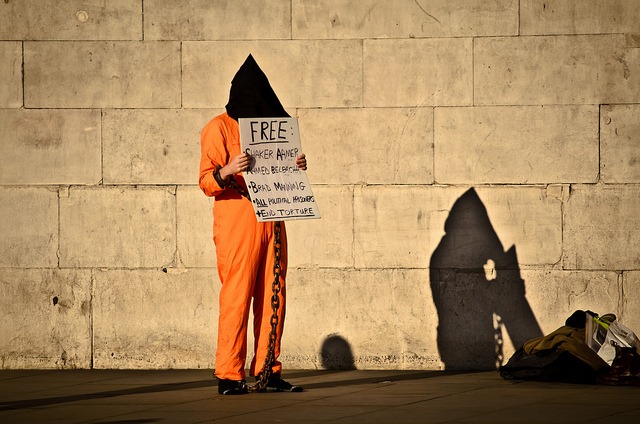The years since the September 11 attacks have seen a myriad of civil lawsuits brought in the United States to expose the horror of the CIA’s Bush-era torture program and obtain compensation and accountability for its victims, only to be dismissed early on as courts invariably bowed to overly expansive claims of state secrets and other obstacles served up by both the Bush and Obama Justice Departments. The Supreme Court, to its everlasting shame, has in turn declined opportunities to avoid blanket denials of justice.
Against that dismal backdrop, the new settlement agreement in the case of Salim v. Mitchell, involving claims against two psychologists hired by the CIA to design and implement the “enhanced interrogation techniques” used at the agency’s black-site prisons around the world, seems a significant if imperfect breakthrough—and one worth rehearsing.
For starters, the case did not end with dismissal. That’s no small matter, as my capsule history above should convey. The mid-August settlement deal avoided a civil jury trial that was set to begin on September 5 in federal court in Spokane, Wash., a litigation stage that no prior case in this realm had ever reached. It marks the first time, ACLU lawyers stress, that the CIA or its private contractors have been held accountable for the agency’s brutal torture program.
The ACLU and the Newark-based law firm Gibbons PC brought the lawsuit under the Alien Tort Claims Act against the pair of psychologist-torturers, James Mitchell and John “Bruce” Jessen, on behalf of three victims of their decency-and-human-rights-defying methods. This litany of abuse—blessed by the U.S. government—included waterboarding, beatings, confinement in coffin-like boxes, confinement in painful stress positions, exposure to extreme temperatures, and severe sleep deprivation.
The plaintiffs were two torture survivors eventually released without charges after officials determined they posed no threat—Suleiman Abdullah Salim, a Tanzanian, and Mohamed Ahmed Ben Soud, a Libyan—and representatives of another detainee, Gul Rahman, an Afghan citizen who died of hypothermia during his barbaric torture regimen 15 years ago. Mr. Rahman, The New York Times has recounted, “was found dead, naked from the waist down on a bare concrete floor in the freezing cold at a secret CIA prison…shackled and short-chained to a wall.” The CIA conducted a review, but no one was ever criminally charged in his death.
Confronted with the civil legal action, the Obama Justice Department responded with a welcome departure, opting not to seek a case shutdown with the shopworn assertion that allowing the case to proceed posed the risk of exposing state secrets. The restraint suggested recognition of the vastly shrunken plausibility of a blunderbuss secrecy claim in light of the reality that the psychologists’ disgraceful consulting role (for which their company was paid $81 million by the CIA) isn’t an actual secret. It had already been publicly documented, along with details about the plaintiffs’ ordeals, most prominently in the declassified executive summary of the Senate Intelligence Committee investigation of the defunct CIA interrogation program released in 2014. Perhaps also—and this may just be my gauzy, Trump-elevated Obama nostalgia asserting itself now—the Obama team had tired of denying torture and abuse victims a legal remedy and helping to cover up a reprehensible path followed by Obama’s predecessor. Obama himself renounced the use of torture at the very beginning of his presidency, but not all other troubling post–September 11 detention and counterterrorism practices. The Trump administration subsequently raised objections to the release of certain documents and to two nonessential oral depositions sought by the defendants, but likewise did not argue the suit’s dismissal was required.
Given the settlement, we will never know whether the veteran federal district judge in Washington State who firmly presided over the case, Justin L. Quackenbush, a Jimmy Carter appointee, would have acceded to a government motion to dismiss the matter—but I doubt it. Defendants’ repeated attempts to have the case deep-sixed—arguing, for example, that the decision to torture the three plaintiffs was a political question inappropriate for determination by a judge—were rebuffed on solid grounds by Judge Quackenbush, who consistently ruled that the plaintiffs had valid claims.
Back to the settlement. It seems to me an unfortunate irony that an important legal case aimed at further exposing a grotesque government program born and carried out in a protective bubble of secrecy, and securing some long-missing accountability for that historic wrong in the form of money damages, has ended with a confidential settlement that requires those involved to keep its full terms from the public.
More secrecy, in other words.
As part of the settlement, the plaintiffs and defendants issued a joint statement in which Mitchell and Jessen acknowledged their part in developing “a program for the CIA that contemplated the use of specific coercive methods to interrogate certain detainees.” The defendants also expressed regret that the three detainees “suffered the abuses,” while still denying responsibility for the prisoners’ treatment, which is galling.
The discovery period occasioned the unearthing of an impressive stash of previously classified documents concerning the planning and operation of the torture program, as well as videotaped depositions of the parties and relevant officials—all available online now for viewing, and offering a deeper understanding of what happened. One immediate effect is to make the absence of criminal prosecutions for what occurred—remember Obama’s distaste for “looking backwards”—seem even more regrettable. The cancelled courtroom reckoning would have allowed a public airing of a portion of that evidence, likely spawning some dramatic moments helpful for reminding people of torture’s evils at a time when the nation’s president is a vocal torture enthusiast. Republicans are seeking to erase this painful and politically fraught history by trying to recall all copies of the complete Senate torture report, and the CIA is holding up release of a book by a former Defense Department official that could shed light on the George W. Bush administration’s decision to embrace torture as a weapon of war.
All that said, it is easy to understand why the plaintiffs would choose to reach a settlement, much as Judge Quackenbush urged the parties and their lawyers to do, rather than risk leaving the outcome to a jury drawn from a part of Washington State that had a lot more Trump than Clinton voters in 2016, and which might be convinced by the defendants’ dishonest argument that they were just “public servants” working at the direction of CIA officials and therefore should not be held liable. I doubt that would have happened given the evidence, but no one can know for sure.
The bottom-line test of whether the case’s resolution is the serious win for the plaintiffs and accountability the ACLU asserts is whether the settlement includes substantial money damages, underwritten by the government or otherwise.
The settlement is silent on damages and its terms prevent lawyers and clients from providing clarification, and as of this writing there has been no further reliable information on this aspect. But it can be reasonably inferred, based on common sense and the obvious pleasure the plaintiffs and their attorneys take from the outcome, that the settlement does come with considerable financial compensation. Also, I have followed the plaintiffs’ lawyers and their outstanding legal accomplishments over the years, and I find it difficult to believe they would agree to a settlement absent a sizable payout for their clients.
If I’m right about that—and I feel confident I am—congratulations are in order, along with guarded optimism over the suddenly more realistic prospect of new cases that might provide other war-on-terror victims of torture and abuse with a chance for redress.
Dorothy Samuels, a former member of the New York Times Editorial Board, is a senior fellow at the Brennan Center for Justice.




0 Comments